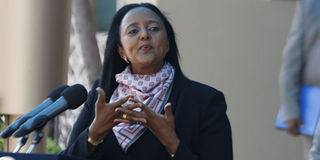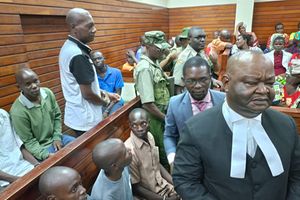Assertive turn for Kenya’s diplomacy

Foreign Affairs Cabinet Secretary Ambassador Amina Mohammed addresses a press conference outside Office of the President in Nairobi on October 14, 2013. PHOTO | ANN KAMONI | FILE
What you need to know:
- The nomination of Mr Uhuru Kenyatta and Mr William Ruto — both accused at the Hague-based ICC of crimes against humanity — to run for the Kenyan presidency on a joint ticket threw the West into a deep diplomatic dilemma.
- The official anthem of the East African Community was also sung during President Kenyatta’s inauguration and the 50th anniversary celebrations.
- The Kenya-West standoff has opened space for China and other Asian powers already gaining a toehold in Africa.
One of the landmark developments in 2013 was a seismic shift in Kenya’s foreign policy.
Confronted with the risk of global financial sanctions and isolation as a “rogue democracy” and a “pariah state” over the cases in the International Criminal Court (ICC), Kenya stridently pandered to the sensibilities of radical pan-Africanism.
It crafted a resolutely Africa-centred and assertive approach. As Kenya celebrated its 50th anniversary of independence on December 12, this pan-African orientation had irreversibly changed the contours of its foreign relations and praxis for generations to come.
Hitherto, Kenya ideologically trod a “neutral” path in African and global affairs. The result was a fairly conservative and West-looking policy that paid lip-service to regionalism and pan-Africanism.
But fierce ideological battles around the ICC trials in 2013 have radicalised this foreign policy orientation.
CRIMES AGAINST HUMANITY
The nomination of Mr Uhuru Kenyatta and Mr William Ruto — both accused at the Hague-based ICC of crimes against humanity — to run for the Kenyan presidency on a joint ticket threw the West into a deep diplomatic dilemma.
Unwittingly, President Barack Obama’s Assistant Secretary of State for African Affairs, Johnnie Carson, drew the ire of Kenyans when he openly warned the voters that “choices” at the ballot box would have “consequences”.
British envoys backed by the US and the European Union subtly threatened to limit contacts with Kenya to “essential” matters if the two were elected. These statements pushed nationalistic rhetoric to a fever pitch and pushed Kenya-West relations to an all-time low in February.
Mr Kenyatta’s Jubilee Alliance repeatedly painted the ICC trials as an assault on Kenya’s sovereignty, casting the 2013 election as a referendum on the court’s right to investigate Kenya’s affairs.
Inadvertently, the West’s heavy rhetoric had won the March 4 presidential election for Mr Kenyatta and Mr Ruto in one of the West’s most important allies in sub-Saharan Africa — a bastion in global counter-terrorism, and a regional hub for aid agencies, international investors and destination for more than a million tourists a year.
After March, the West hedged on a “wait-and-see” policy, expecting Mr Kenyatta and Mr Ruto to renege on their promises and fail to turn up for their trials.
This would have been met with far more serious tranche of actions, including arrest warrants, individual sanctions, and global financial isolation to teach the Kenyan voters the lesson that choices truly have “consequences”.
Instead, Kenya adopted a policy of “strategic non-compliance”. Legally, the accused would comply with the court. But politically, the Kenyan state would mount a “passive resistance” hoisted on the four ideological planks of nationalism, regionalism, pan-Africanism and globalism.
From March, Kenya took a radical pan-African turn in its foreign policy based on a four-point strategy.
The first is “Kenyan nationalism” as the bedrock of a “look-inward” foreign policy with a strong cultural thrust. Prayers during Mr Kenyatta’s inauguration on April 9 and the Jubilee celebrations reflected Prof Ali Mazrui’s idea of Africa’s “triple heritage” of African traditional culture and civilisation, Islam and Christianity.
Further, 21-gun salutes sought to reassert and dramatise Kenya’s “sovereignty”. And the Kenyan National anthem has been frequently sang to foster the spirit of a pan-Kenyan consciousness and identity. And undergirding presidential speeches at home and abroad is a distinctly assertive “nationalist” idiom of “sovereignty” and “mutual respect”.
The second pillar is regionalism. Long before the March election, Jubilee started off on diplomatic forays into Uganda, Tanzania, Burundi, Ethiopia, Rwanda and South Sudan. During his inauguration, Mr Kenyatta declared that Kenya’s destiny is inextricably joined to that of the region.
The official anthem of the East African Community was also sung during President Kenyatta’s inauguration and the 50th anniversary celebrations.
The end of regionalism is shared prosperity. As such, Kenya is working with Ethiopia and South Sudan to implement an ambitious Sh2.1 trillion flagship project known as LAPPSET that seeks to jointly build a second port in Lamu – road, fibre-optic cable, railway and pipeline linking the three countries.
Kenya is also working with Uganda and Rwanda to build a Sh1.3 trillion standard gauge railway from Mombasa to Malaba and Kisumu and ultimately to Uganda and Rwanda. But resistance to the railway initiative and corruption charges linked to tender wars within the Jubilee Coalition risk derailing the project.
Regionally, the railway project is seen as being conceived within the exclusive framework of “the coalition of the willing” involving Kenya, Rwanda and Uganda and excluding Tanzania and Burundi in the EAC.
But the real threat to these initiatives is security. In September, terrorists linked to al-Shabaab attacked the upmarket Westgate Mall in Nairobi, killing nearly 70 people. And small-scale sporadic attacks have continued in Nairobi, Mombasa and Northern Kenya.
Kenya’s soldiers are inside Somalia fighting the al-Shabaab terrorists and its leaders have supported initiatives designed to move Somalia from war to peace, including the Conference on Somalia organised by the British government in London in May and the European Union-sponsored Conference on a New Deal for Somalia on September 16. But piracy and terrorism remain a threat.
A new security crisis in South Sudan is taking a heavy toll on Kenya’s security and economic agenda.
An estimated 30,000 Kenyans who have been working in South Sudan are caught up in the crisis, which involves military factions aligned to President Salva Kiir and former vice-president Riek Machar.
In a maiden experiment in dealing with the evacuation of Kenyan nationals in Africa’s trouble spots, the Kenya Defence Forces airlifted tonnes of food to the stranded Kenyans in Africa’s youngest country. But Kenya needs to scale up its peace diplomacy to broker peace in Juba and forestall the failure of its projects.
The third pillar is pan-Africanism. During Nelson Mandela’s national memorial service, President Kenyatta was one of three personalities — including presidents Barack Obama and Robert Mugabe — who were wildly cheered by mourners, drawing attention to him as a potential heir to the pan-African mantle.
All this started when a dozen-odd African leaders attended his inauguration in April. Nearly two dozen attended the December Jubilee celebrations.
Kenya under President Kenyatta is the new focal point of pan-African resistance.
During the inauguration and the 50th anniversary fete, Ugandan President Yoweri Museveni praised Kenyans as “the new Mau Mau” for rejecting the “blackmail” of “usual opinionated and arrogant actors (who) are now using the ICC to install leaders of their choice in Africa and eliminate the ones they do not like.”
In May, President Kenyatta successfully marshalled majority of African states behind Kenya’s request for the deferral of the ICC cases.
And in October, ahead of the opening of President Kenyatta’s trial on November 12 (which was later moved to February 5), the AU convened an extra-ordinary summit that adopted perhaps the boldest challenge to the West’s global hegemony since the end of apartheid.
It called on President Kenyatta and his deputy to defy the ICC trials pending action by the United Nations Security Council on Kenya’s deferral request.
The fourth and final pillar is the assertion of the global principle of equity and respect of all nations.
On November 15, the AU resolution calling on the Security Council to halt the trials of Kenya’s president and his deputy was put to vote.
Although the resolution was voted down, this was a partial triumph for Kenya, which drew pan-African and global attention at the highest level to its cases.
Similarly, during the Assembly of State Parties (to the Rome Statute that establishes the ICC) meeting at The Hague, Kenya clinched another symbolic victory.
FROSTY RELATIONS
Its leadership was recognised as having “extraordinary duties” as heads of state (Rule 134) and allowed to use the video-link during trial in absence.
The Kenya-West standoff has opened space for China and other Asian powers already gaining a toehold in Africa.
As a counterpoise to the frosty relations with the West, Kenya has bolstered the “Look-East” policy introduced under President Mwai Kibaki in 2004-2007.
In mid-August, President Kenyatta visited Russia and China as part of Kenya’s effort to strengthen relations with the East (including India) and the global South (Brazil, Argentina).
But Kenya’s Look-East policy is still a weak economic alternative. Kenya remains vulnerable to its historic dependency on the West for its exports.
In 2011, Kenya exported goods worth Sh152 billion (23 per cent of its total exports) to the West compared to only Sh3.8 billion to China and Sh9.8 billion to India.
But the ground is politically shifting. The request by the ICC Prosecutor, Fatou Bensouda, for a delay of the trial against President Kenyatta as a result of shortage of evidence signals the collapse of the case. As the year ends, the question is whether Kenya will stay the course in its assertive pan-African foreign policy if the case is terminated.
Prof Kagwanja is the CEO of the Africa Policy Institute.





